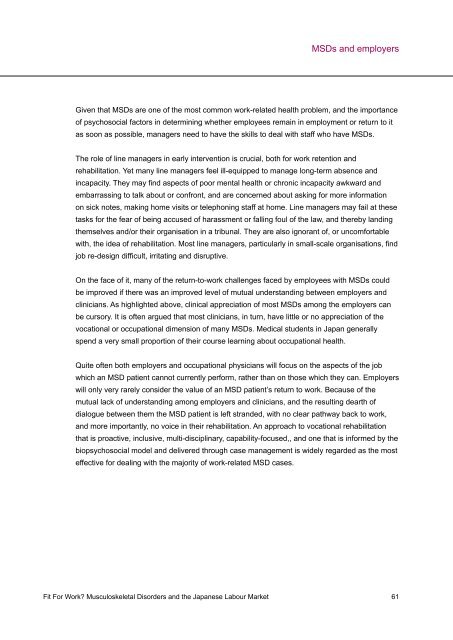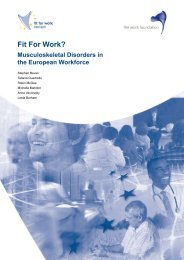English version - Fit for Work Europe
English version - Fit for Work Europe
English version - Fit for Work Europe
Create successful ePaper yourself
Turn your PDF publications into a flip-book with our unique Google optimized e-Paper software.
MSDs and employers<br />
Given that MSDs are one of the most common work-related health problem, and the importance<br />
of psychosocial factors in determining whether employees remain in employment or return to it<br />
as soon as possible, managers need to have the skills to deal with staff who have MSDs.<br />
The role of line managers in early intervention is crucial, both <strong>for</strong> work retention and<br />
rehabilitation. Yet many line managers feel ill-equipped to manage long-term absence and<br />
incapacity. They may find aspects of poor mental health or chronic incapacity awkward and<br />
embarrassing to talk about or confront, and are concerned about asking <strong>for</strong> more in<strong>for</strong>mation<br />
on sick notes, making home visits or telephoning staff at home. Line managers may fail at these<br />
tasks <strong>for</strong> the fear of being accused of harassment or falling foul of the law, and thereby landing<br />
themselves and/or their organisation in a tribunal. They are also ignorant of, or uncom<strong>for</strong>table<br />
with, the idea of rehabilitation. Most line managers, particularly in small-scale organisations, find<br />
job re-design difficult, irritating and disruptive.<br />
On the face of it, many of the return-to-work challenges faced by employees with MSDs could<br />
be improved if there was an improved level of mutual understanding between employers and<br />
clinicians. As highlighted above, clinical appreciation of most MSDs among the employers can<br />
be cursory. It is often argued that most clinicians, in turn, have little or no appreciation of the<br />
vocational or occupational dimension of many MSDs. Medical students in Japan generally<br />
spend a very small proportion of their course learning about occupational health.<br />
Quite often both employers and occupational physicians will focus on the aspects of the job<br />
which an MSD patient cannot currently per<strong>for</strong>m, rather than on those which they can. Employers<br />
will only very rarely consider the value of an MSD patient’s return to work. Because of the<br />
mutual lack of understanding among employers and clinicians, and the resulting dearth of<br />
dialogue between them the MSD patient is left stranded, with no clear pathway back to work,<br />
and more importantly, no voice in their rehabilitation. An approach to vocational rehabilitation<br />
that is proactive, inclusive, multi-disciplinary, capability-focused,, and one that is in<strong>for</strong>med by the<br />
biopsychosocial model and delivered through case management is widely regarded as the most<br />
effective <strong>for</strong> dealing with the majority of work-related MSD cases.<br />
<strong>Fit</strong> For <strong>Work</strong>? Musculoskeletal Disorders and the Japanese Labour Market 61







